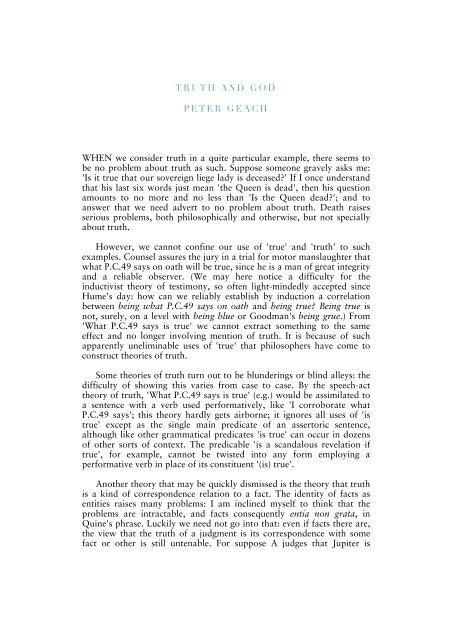PETER GEACH VIRTUAL ISSUE NO. 1 Truth and God
PETER GEACH VIRTUAL ISSUE NO. 1 Truth and God
PETER GEACH VIRTUAL ISSUE NO. 1 Truth and God
You also want an ePaper? Increase the reach of your titles
YUMPU automatically turns print PDFs into web optimized ePapers that Google loves.
TRUTH AND GOD<strong>PETER</strong> <strong>GEACH</strong>WHEN we consider truth in a quite particular example, there seems tobe no problem about truth as such. Suppose someone gravely asks me:'Is it true that our sovereign liege lady is deceased?' If I once underst<strong>and</strong>that his last six words just mean 'the Queen is dead', then his questionamounts to no more <strong>and</strong> no less than 'Is the Queen dead?'; <strong>and</strong> toanswer that we need advert to no problem about truth. Death raisesserious problems, both philosophically <strong>and</strong> otherwise, but not speciallyabout truth.However, we cannot confine our use of 'true' <strong>and</strong> 'truth' to suchexamples. Counsel assures the jury in a trial for motor manslaughter thatwhat P.C.49 says on oath will be true, since he is a man of great integrity<strong>and</strong> a reliable observer. (We may here notice a difficulty for theinductivist theory of testimony, so often light-mindedly accepted sinceHume's day: how can we reliably establish by induction a correlationbetween being what P.C.49 says on oath <strong>and</strong> being true? Being true isnot, surely, on a level with being blue or Goodman's being grue.) From'What P.C.49 says is true' we cannot extract something to the sameeffect <strong>and</strong> no longer involving mention of truth. It is because of suchapparently uneliminable uses of 'true' that philosophers have come toconstruct theories of truth.Some theories of truth turn out to be blunderings or blind alleys: thedifficulty of showing this varies from case to case. By the speech-acttheory of truth, 'What P.C.49 says is true' (e.g.) would be assimilated toa sentence with a verb used performatively, like 'I corroborate whatP.C.49 says'; this theory hardly gets airborne; it ignores all uses of 'istrue' except as the single main predicate of an assertoric sentence,although like other grammatical predicates 'is true' can occur in dozensof other sorts of context. The predicable 'is a sc<strong>and</strong>alous revelation iftrue', for example, cannot be twisted into any form employing aperformative verb in place of its constituent '(is) true'.Another theory that may be quickly dismissed is the theory that truthis a kind of correspondence relation to a fact. The identity of facts asentities raises many problems: I am inclined myself to think that theproblems are intractable, <strong>and</strong> facts consequently entia non grata, inQuine's phrase. Luckily we need not go into that: even if facts there are,the view that the truth of a judgment is its correspondence with somefact or other is still untenable. For suppose A judges that Jupiter is





